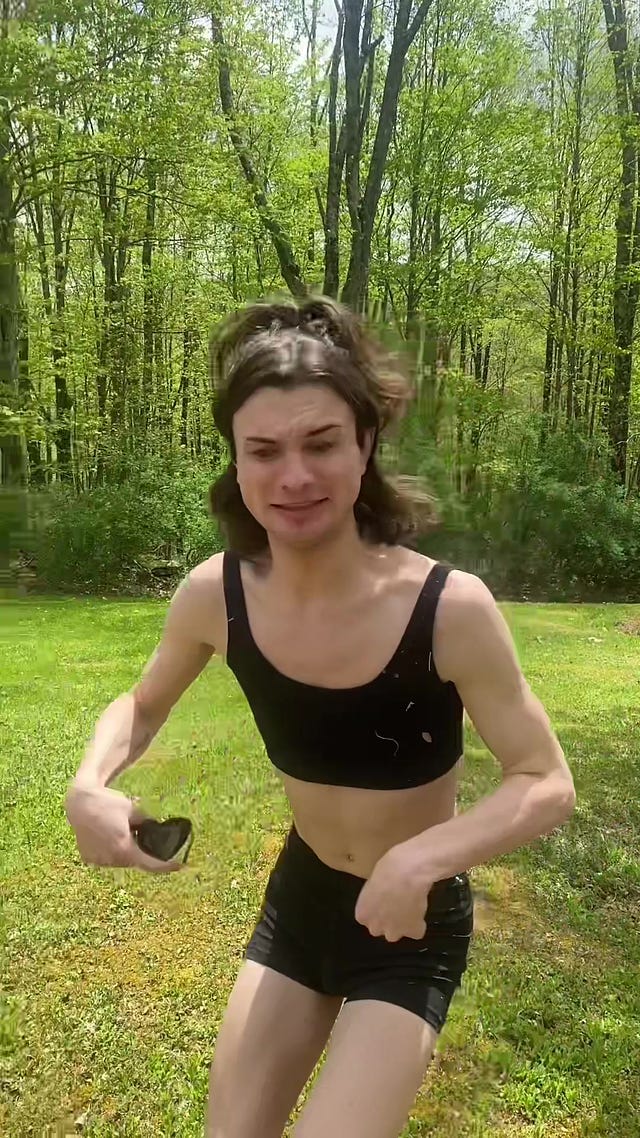Kill The Mother
Kill The Mother
In Ireland this week, an obviously highly disturbed and dangerous male, who now identifies as a woman, was jailed for five and a half years - in a women’s prison - for threatening to rape and murder his own mother. At one point he told care workers
“If I got into (my mother’s) house I would run towards her and put the knife into her body and into her genitalia...prolong my mum’s suffering for as long as possible...I would stab her, but not in her heart or neck, I’d want to put her through lots of torture, fear and humiliation. […] I would bring a screwdriver to insert inside her genitalia because I am a woman and women rape using objects.”
Lawyers for the defence argued that this was fantasy rather than a serious threat. Gender-critical feminists, meanwhile, argue that Ireland’s gender ideologues are ignoring the obvious severe danger this individual poses to the women who will now be locked up with him. But I think there’s a sense in which the reckless endangerment of incarcerated women by imprisoning them with an obviously criminally insane male isn’t so much an aberration as an existing trend writ large: an intensifying fantasy of annihilating women - and, particularly, of destroying the mother.
For the most part, I don’t mean this literally, but in the psychoanalytic sense of fantasy-murder. This was paradigmatically set out in 1899, in Freud’s The Interpretation of Dreams - but with the sexes reversed. Freud postulated a developmental stage in which little boys fantasise about “killing” their father - really, taking his place - including in relationship to the mother. This has become known as the “Oedipus complex”, after the figure from Sophocles’ tragedy who is fated, albeit unwittingly, to kill his own father and marry his mother.
Freud’s psychodynamic theories don’t get much airtime these days. But rather than treating them simply as ‘debunked’ we might read them as culture-bound. That is, kids grow up today in homes where family dyamics don’t lend themselves to the developmental pathways Freud described, meaning they don’t have much interpretive value.
But I don’t think it follows from this that we grow up any less ambivalent toward our parents than seems to have been the case in 1899. My hunch is rather that as parental roles have shifted, so proportionally more of the ambivalence and rage that was once directed at fathers has come to be pointed at mothers. And while ‘Barbie Kardashian’ is an extreme case, that includes a history of depraved child abuse, I see traces of a similar fantasy of mother-attack and mother-erasure percolating through contemporary culture in ways that feel distinctive to our time and worthy of comment.
One of the week’s most uncomfortable clips featured TikTok trans activist Dylan Mulvaney on Drew Barrymore’s talk show. As she interviews Mulvaney, Barrymore rises from her sofa and kneels in front of Mulvaney in an attitude that feels as though it’s meant to evoke girlish innocence and intimacy. Both then sit down on the floor together, Barrymore crossing her legs, as though sharing secrets in a pink-painted bedroom after school.

Here Barrymore and Mulvaney both seemed to be acting out a fantasy of adolescent girlhood in a way that implies a real feeling of loss or longing. And lurking in there is something new, and very post-Freud: rage against the mother. A common theme in natal women’s responses to Mulvaney’s notorious TikTok ‘Days of Girlhood’ videos is a protest at a kind of play-acting that feels as much hostile and parodic as affectionate and aspirational. That is, there’s a sense watching Mulvaney that that this role-playing of girlish femininity has a sardonic, even contemptuous edge, as in this “nature walk” video with its “screaming at bug” punch line:
 Tiktok failed to load.
Tiktok failed to load.Enable 3rd party cookies or use another browser
Elsewhere, it’s difficult not to see a rage-filled parody of womanhood in publicly available images of “Barbie Kardashian”, or indeed in the choice of two names that themselves represent a kind of hyper-stylised, artificial femininity - the iconic doll, and an equally iconic doll-like and highly artificial woman:
Elsewhere, even progressive publications such as Slate acknowledge that drag performances of femininity often have a parodic if not outright misogynistic undertone.
I’m not suggesting, of course, that either Barrymore and Mulvaney literally want to kill their mother. But both are on record as describing, to put it mildly, complicated relationships with maternal figures in their own lives. Barrymore ‘divorced’ her mother and lived alone from the age of 14, having been put to work from infancy as a model and actress. Mulvaney, meanwhile, speaks in the Barrymore interview about having acquired a ‘chosen family’ to ‘take care of me’ - in contrast with a birth family described elsewhere as ‘very conservative’ - from which we can infer that there isn’t much of a relationship there any more.
For the avoidance of doubt, I am not saying there’s a direct continuum between the murderous, matricidal hostility expressed by ‘Barbie Kardashian’ and the theatrical TikTok femme roleplaying of female-identified influencers such as Mulvaney, or the ‘girly’ play-acting of motherless Barrymore. There’s a world of difference between what psychoanalysis calls ‘murderous fantasies’ and actual murderous violence. But buried deep in the cultural morass surrounding contemporary gender debates I keep catching glimpses of this rage: one so profound and wordless I’ve struggled to capture and describe it.
It’s as though the longing is not just to lower the standing of women - especially mothers - but to replace us, or (even if only in fantasy) to eliminate us from existence. It might take the form of divorcing a mother who is experienced as inadequate; replacing mothers with hired “gestators”, exowombs, or “full-body gestational donation”. It might take the form of erasing the language of maternity and motherhood from scientific papers, campaigns, medical information, HR policies and even the law, as in Ireland’s recent moves to “update” the constitution to remove special protection for stay at home mothers.
It shows itself, too, in the incoherent rage we see directed at the (often middle-aged, often themselves mothers) women who stand against gender ideology at Standing for Women rallies. This rage almost always begins with comments, familiar to any woman who has left the Maiden stage for Mother or Crone, about age and ugliness. As though, in fact, womanhood is synonymous with girlhood, a costume or performance that can be put on, while the rest of the female-specific hero’s journey can and must be abolished.
And it can take subtler forms, too, as when Gov. Peggy Flanagan declares that the only way to be “a good parent” - by which, of course, she means a good mother - is to liquidate your own authority and agency entirely:

Maternal love, in this paradigm, contains no element of boundary or agency. The good and loving mother doesn’t stop at being linguistically erased, becoming a “gestator” or “birthing parent”. As the child grows the good mother must erase herself still further. Wholly stripped of authority, save the authority to say ‘yes’ and to validate, she becomes a purely passive enabling conduit for her child’s self-actualisation. And this extends even to granting permission, if necessary, for that child to pursue a supposedly innate (and not at all iatrogenic) desire for “gender affirming care” with a host of horrific side-effects beyond the capacity of a child to grasp or consent to.
And I think it’s grown worse over my lifetime. Where is this coming from, this desire to annihilate the mother? Why have the murderous fantasies that occupy our collective infantile subconscious turned their hostility from the father to the mother? What changed?
Is this rage powered by mass maternal deprivation: multiple generations now of daycare babies? Something in the cultural water? An acceleration of that matricidal tendency Susan Faludi identified in liberal feminism? The increased presence of women in public life? Something else? I’m thinking aloud here. I would love to hear from readers on whether you recognise what I’m describing here, and if so what you think is feeding it.
Source: Reactionary Feminist





Comments
Post a Comment